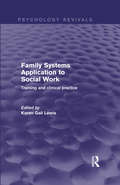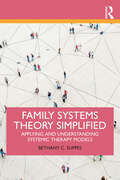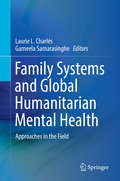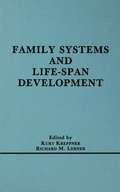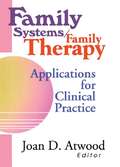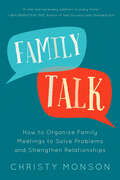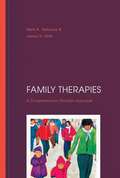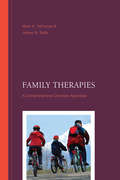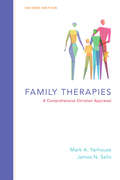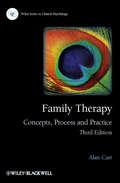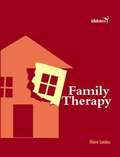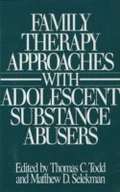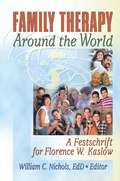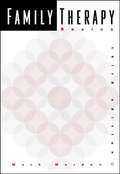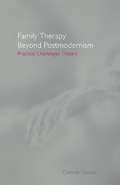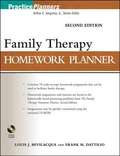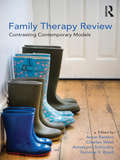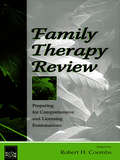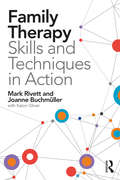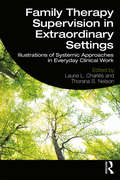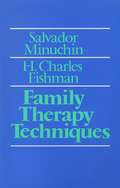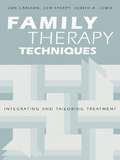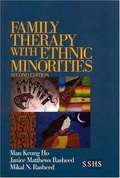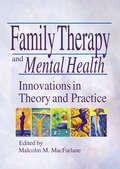- Table View
- List View
Family Systems Application to Social Work: Training and Clinical Practice (Psychology Revivals)
by Karen Gail LewisOriginally published in 1991, this title is a valuable social work text which demonstrated how to apply family system concepts to clinical situations encountered in work with inner-city populations at the time. Unlike traditional theories in clinical social work which were oriented toward the individual, this fascinating book offers a paradigm for social work that encompasses the client, his or her immediate and extended family, the community, the government, and the social worker. The family systems concepts in this refreshing volume are illustrated by case examples addressing the specific issues of AIDS and drug abuse, homelessness, foster care, wife abuse, care of those with intellectual disabilities, and adoption issues. Social workers and social work students can still gain perspective from these insightful chapters and will discover that it is not pathological people that make difficult populations, but difficult life situations that breed pathology.
Family Systems Theory Simplified: Applying and Understanding Systemic Therapy Models
by Bethany C. SuppesIn this textbook for students and instructors of marriage and family therapy, Bethany C. Suppes offers a refreshed perspective of family systems therapy (FST), focusing on the importance of understanding its concepts and demonstrating how models of marriage and family therapy can appear practically in counseling. In Part I, Suppes begins with a theoretical overview of FST, including the history of development, key theorists, and defining core concepts. In Part II, she focuses on application and explores nine key components of FST, identifying how various systemic therapy models apply these concepts. The book also covers the professional responsibilities of the systemic therapist and cultural considerations for those using the theory professionally. Primarily written for those having their first exposure to the ideas of FST, it explains concepts in a language and structure that is more comprehensive and culturally aware than existing literature, aiming to improve the therapeutic process for both therapist and client.
Family Systems and Global Humanitarian Mental Health: Approaches in the Field
by Laurie L. Charlés Gameela SamarasingheThis powerful reference explores the processes and practices of family systems therapy as conducted in humanitarian situations across the globe. It follows the editors’ previous volume Family Therapy in Global Humanitarian Contexts: Voices and Issues from the Field in defining systemic therapy as multidisciplinary, portable, and universal, regardless of how far from traditional clinical settings it is applied. Chapters from diverse locales document remarkable examples of courage and resilience on the part of therapists as well as clients in the face of war, unjust policies, extreme inequities, and natural disasters. Contributors describe choosing and implementing interventions to fit both complex immediate challenges and their local contexts as they work to provide systemic family and public mental health services, including:Assisting families of missing persons in CyprusEmergency counseling after a Florida school shooting Therapeutic metaphors in a Lebanese refugee campSessions with separated family members on the U.S./Mexico borderAddressing healthcare disparities in the CaribbeanTraining family therapists in Sri LankaFamily and community support during the Ebola epidemic in GuineaProviding systemically oriented therapy and supervision in high-conflict countriesRisk assessment using emerging media in Chilean communitiesFamily Systems and Global Humanitarian Mental Health: Approaches in the Field is a valuable resource for professionals in both the global North and South, including family therapists, psychologists, psychiatrists, nurses and public health professionals, and mental health and psychosocial support providers working in humanitarian settings.
Family Systems and Life-span Development
by Richard M. Lerner Kurt KreppnerThis interdisciplinary volume presents international research and theories focusing on the development of the individual across the life span. Centering on "family" as the key context influencing, and being influenced by the developing person, the contributors to this volume discuss an array of theoretical models, methodological strategies, and substantive foci linking the study of individual development, the family system, and the broader context of human development. The volume presents continuing empirical research and theories in the realm of individual and family development and features a developmental, contextual view from a process-oriented vantage point.
Family Systems/Family Therapy: Applications for Clinical Practice
by Joan D AtwoodUse your family therapy skills to coordinate multidisciplinary teams!This comprehensive book examines family therapy issues in the context of the larger systems of health, law, and education. Family Systems/Family Therapy shows how family therapists can bring their skills to bear on a broad range of problems, both by considering the effects of larger social systems and by cooperating with professionals in other disciplines. Because family therapists are trained to understand how systems operate, they can offer wise guidance whether the dysfunction is occurring within the family system or between the individual and the larger systems of society. The studies and projects reported in Family Systems/Family Therapy demonstrate the ways in which family therapists can help create dialogues of inclusion to develop innovative, effective solution plans. The PEACE project, for example, brings together judges, attorneys, divorcing parents, and therapists to help children deal with the strains of divorce. Family Systems/Family Therapy includes both practical case histories and theoretical considerations. This thought-provoking book suggests areas in which an intersystems approach can be especially effective, including: preventing substance abuse in adolescent girls enhancing awareness of adolescent dating violence managing geriatric care, not just for the identified patient, but for the family as a whole doing court-ordered therapy for divorcing couples working with children labeled as difficult and their teachersFamily Systems/Family Therapy will give family therapists a new vision of what they can achieve when working in the context of individuals, families, or the broader system.
Family Talk: How to Organize Family Meetings to Solve Problems and Strengthen Relationships
by Christy MonsonChristy Monson, a retired family therapist, provides in simple language concrete examples and clear language to family success through family councils. While families are diverse and their needs are unique, a family council provides a safe and strong environment for every family to discuss issues and explore the best ways to have the family succeed. A family council is not just any meeting. It's a special event that provides a background and foundation to create healthy family synergy. Monson teaches families what a family council is and what it is not, why it’s a perfect environment for teaching, for exploring difficult issues, learning how to play, and how best to solve problems at home, school, or work. Monson also includes information for families with special needs. Family councils are a great way to bring children and parents together in a positive environment where they can discuss and solve problems
Family Therapies: A Comprehensive Christian Appraisal
by Mark A. Yarhouse James N. SellsChristian therapists doing family therapy have never had a resource to help them navigate the various family therapy theories from a Christian perspective--until now. In this book Mark A. Yarhouse and James N. Sells survey the major approaches to family therapy and treat, within a Christian framework, significant psychotherapeutic issues. The wide array of issues covered includescrisis and traumamarital conflictseparation, divorce and blended familiesindividual psychopathologysubstance abuse and addictionsgender, culture, economic class and racesexual identityCalling for an integrated approach of "responsible eclecticism," they conclude with a vision for Christian family therapy. A landmark work providing critical Christian engagement with existing models of family therapy, this volume was written for those studying counseling, social work, psychology or family therapy. Family Therapies will also serve as an indispensable resource for those in the mental health professions, including counselors, psychologists, family therapists, social workers and pastors.
Family Therapies: A Comprehensive Christian Appraisal (CAPS #5)
by Mark A. Yarhouse James N. SellsChristian therapists doing family therapy have never had a resource to help them navigate the various family therapy theories from a Christian perspective--until now. In this book Mark A. Yarhouse and James N. Sells survey the major approaches to family therapy and treat, within a Christian framework, significant psychotherapeutic issues. The wide array of issues covered includes • crisis and trauma • marital conflict • separation, divorce and blended families • individual psychopathology • substance abuse and addictions • gender, culture, economic class and race • sexual identity Calling for an integrated approach of "responsible eclecticism," they conclude with a vision for Christian family therapy. A landmark work providing critical Christian engagement with existing models of family therapy, this volume was written for those studying counseling, social work, psychology or family therapy. Family Therapies will also serve as an indispensable resource for those in the mental health professions, including counselors, psychologists, family therapists, social workers and pastors.
Family Therapies: A Comprehensive Christian Appraisal (Christian Association for Psychological Studies Books #5)
by Mark A. Yarhouse James N. Sellscrisis and traumamarital conflictseparation, divorce, and blended familiessubstance abuse and addictionsgender, culture, economic class, and racesexual identity
Family Therapy
by Alan CarrNow in its third edition, this highly regarded and well-established textbook includes up-to-date coverage of recent advances in family therapy practice and reviews of latest research, whilst retaining the popular structure and chapter features of previous editions. Presents a unique, integrative approach to the theory and practice of family therapyDistinctive style addresses family behaviour patterns, family belief systems and narratives, and broader contextual factors in problem formation and resolutionShows how the model can be applied to address issues of childhood and adolescence (e.g. conduct problems, drug abuse) and of adulthood (e.g. marital distress, anxiety, depression)Student-friendly features: chapters begin with a chapter plan and conclude with a summary of key points; theoretical chapters include a glossary of new terms; case studies and further reading suggestions are included throughout
Family Therapy
by Elaine LandauMany Americans judge their families by the highest of standards. We expect a problem-free family, featuring a happily married couple and two well-adjusted children. In reality, most families don't reflect our ideals, and many are faced with conflicts such as divorce, abuse, and communication issues. Find out how family therapy has helped real family members to identify their problems and voice their opinions. With the help of a family therapist, every family can successfully grow -- and change -- together.
Family Therapy Approaches with Adolescent Substance Abusers
by Matthew D. Selekman Thomas C. ToddEleven contributions present a diversity of approaches for the family counselor who is not a chemical dependency specialist but who seeks guidelines for successful intervention through family therapy.
Family Therapy Around the World: A Festschrift for Florence W. Kaslow
by William NicholsAn international celebration of the work of Florence W. Kaslow! Family Therapy Around the World: A Festschrift for Florence W. Kaslow celebrates the life and work of the distinguished family therapist with an international collection of essays that reflects the dynamic state of clinical practice, research, and theory. Professionals and practitioners from 15 countries honor Dr. Kaslow&’s pioneering contributions to family therapy and family psychology by offering practical solutions to the real, everyday problems that affect today&’s world. The essays are varied and extensive, incorporating cultural and social factors to explore new territory in family therapy through cutting-edge research, clinical cases, and theoretical developments. Family Therapy Around the World recognizes the profound influence of Dr. Kaslow, who was instrumental in the adoption of the Journal of Family Psychotherapy as the official journal of the International Family Therapy Association (IFTA). The spirit of her work flows through the book&’s essays, which represent the latest thinking and practice developments from clinicians, theoreticians, and researchers around the world. The book paints a clear portrait of the current state of family therapy across the globe, including contributions from Japan; the United Kingdom; Israel; India; Argentina; Russia; Sweden; Iceland; Yugoslavia; Italy; Australia; Norway; Chile; and the United States. Topics examined in Family Therapy Around the World include: salutogenic family therapy (Sweden) working with abusing families (United Kingdom) family life in an atmosphere of chronic stress and social transformation (Yugoslavia) adult children dealing with parental divorce (Italy) exploring culture in practice (United Kingdom and India) fathers who make a difference (Argentina) sex avoidance among young couples (Israel) working toward triadic communication with problematic families (Japan) and much more! For decades, Dr. Florence Kaslow has been an active practitioner, editor, author, teacher, and researcher. Family Therapy Around the World: A Festschrift for Florence W. Kaslow represents a small sampling of the effect her work has had on the family therapy community across the globe.
Family Therapy Basics (3rd Edition)
by Mark WordenThis text provides readers with the critical link between theory and practice illustrating how to actually do family therapy. It is a primer that takes students step-by-step through the process of conducting family therapy sessions. The book starts with the initial session and finishes with the terminating session covering assessment, diagnosis, skills and techniques needed throughout each stage.
Family Therapy Beyond Postmodernism: Practice Challenges Theory
by Carmel FlaskasPostmodernist ideas are widely used in family therapy. However, it is argued that these ideas have their limits in meeting the richness and complexity of human experience and therapy practice. Family Therapy Beyond Postmodernism examines postmodernism and its expressions in family therapy, raising questions about:* reality and realness* the subjective process of truth* the experience of self.Alongside identifying the difficulties in any sole reliance on narrative and constructionist ideas, this book advocates the value of selected psychoanalytic ideas for family therapy practice, in particular:* attachment and the unconscious* transference, projective identification and understandings of time* psychoanalytic ideas about thinking and containment in the therapeutic relationship.Family Therapy Beyond Postmodernism offers a sustained critical discussion of the possibilities and limits of contemporary family therapy knowledge, and develops a place for psychoanalytic ideas in systemic thinking and practice. It will be of great interest to family therapists, psychotherapists and other mental health professionals.
Family Therapy Glossary
by Craig A. EverettA compilation of core concepts from the field of marriage and family therapy, this quick reference is an invaluable resource for students, new professionals, and educators alike. It is a compact and thorough directory of terms that can be used as an excellent companion piece for those just beginning their study of marriage and family therapy. It is also an excellent study guide for new graduates preparing to take licensure and other comprehensive exams.
Family Therapy Homework Planner
by Arthur E. Dattilio Frank M. Jongsma Bevilacqua Louis J.Features new and updated assignments and exercises to meet the changing needs of mental health professionals The Family Therapy Homework Planner, Second Edition provides you with an array of ready-to-use, between-session assignments designed to fit virtually every therapeutic mode. This easy-to-use sourcebook features: New and updated homework assignments consistent with evidence-based therapies and grouped by presenting problems including adoption, communication issues, interracial family problems, sexual abuse, and school concerns 78 ready-to-copy exercises covering the most common issues encountered by families in therapy, such as family-of-origin interference, depression in family members, divorce, financial conflict, adolescent and parent conflicts, traumatic life events, and dependency issues Expert guidance on how and when to make the most efficient use of the exercises Assignments that are cross-referenced to The Family Therapy Treatment Planner, Second Edition-so you can quickly identify the right exercise for a given situation or problem A CD-ROM that contains all the exercises in a word-processing format-allowing you to customize them to suit you and your clients' unique styles and needs Additional resources in the PracticePlanners® series: Treatment Planners cover all the necessary elements for developing formal treatment plans, including detailed problem definitions, long-term goals, short-term objectives, therapeutic interventions, and DSMTM diagnoses. For more information on our PracticePlanners® products, including our full line of Treatment Planners, visit us on the Web at: www. wiley. com/practiceplanners
Family Therapy Review: Contrasting Contemporary Models
by Charles West Anne Rambo AnnaLynn Schooley Tommie V. BoydThis unique text uses one common case to demonstrate the applications of a wide range of family therapy models. Readers will find it useful when studying for the national family therapy licensing exam, which requires that exam takers be able to apply these models to case vignettes. The authors, all of whom are practicing family therapists, apply their chosen model of family therapy to a single, hypothetical case to highlight what each model looks like in practice. Beginning therapists will find the exposure to new ideas about therapy useful, and will be better able to establish which approaches they want to explore in more depth. Experienced therapists and supervisors will find it useful to understand what “those other family therapists” are doing, and to meet the challenge of supervising those from different perspectives. Family Therapy Review is the practical tool therapists need to make sense of the field, and meet the varied challenges their clients present.
Family Therapy Review: Preparing for Comprehensive and Licensing Examinations
by Robert H. CoombsThis book offers a clear, readable overview of all the knowledge and skills those training as marriage and family therapists and counselors need to pass final degree program, certification or licensing examinations. It is organized into three sections: Basic Clinical Knowledge and Skills, Common Client Problems, and Career Issues. Each chapter includes challenging study questions that enable readers to assess their own level of understanding--15 true/false questions at the outset checking on baseline knowledge, 30 multiple-choice questions interspersed through the text underlining crucial points, and 10 provocative discussion questions at the end facilitating synthesis. Each chapter also provides a glossary of key terms and, in addition to references, annotated suggestions for further reading and Web site exploration. Students and trainees will find Family Therapy Review: Preparing for Comprehensive and Licensing Examinations a resource to which they will go on referring long after it has helped them through their examinations; faculty and established professionals will find it a useful one-stop summary of current thinking about best practice.
Family Therapy Skills and Techniques in Action: Skills And Techniques In Action
by Mark Rivett Joanne BuchmüllerPlease watch the following short video advertisement for the book, featuring the Editors: https://www.youtube.com/watch?v=N1ApHAQIMzQ&feature=youtu.be Relationships are a resource for healing a range of psychological difficulties. This is the fundamental principle of family therapy, an increasingly influential form of psychotherapy that is building up a strong evidence base in a range of psychological problems across the life cycle. Family Therapy Skills and Techniques in Action is both a guide to a variety of family therapy techniques and a review of their history. It provides a thorough explanation of the techniques, explaining their origins and use in contemporary family practice, whilst guiding readers in learning new skills. The authors provide film examples and transcripts of the techniques in action so that readers can develop their skills in a practical way. The book is divided into sections that describe and demonstrate skills such as: Assessing a family; Building a therapeutic relationship with multiple family members; Enactment; Reframing; Using circular questions; ‘Externalising’ the problem; Using family therapy skills in individual work; Understanding and utilising systemic supervision. Family Therapy Skills and Techniques in Action will be an essential practical manual for a range of family therapy skills which can be used in family work by family practitioners from a variety of backgrounds: counsellors, support workers, social workers, psychologists, generic therapists and nurses.
Family Therapy Supervision in Extraordinary Settings: Illustrations of Systemic Approaches in Everyday Clinical Work
by Thorana S. Nelson Laurie L. CharlesFamily Therapy Supervision in Extraordinary Settings showcases the dynamism of systemic family therapy supervision/consultation as it expands beyond typical and historical traditions. In this unique collection, contributors write about their innovations, unexpected learnings, and “perfect accidents” in the context of systemic therapy. These essays highlight creative approaches to supervision, present a wide variety of clinical cases and therapy settings, and demonstrate how training takes place in real time. Each chapter illustrates increasingly diverse settings in which systemic family therapy services are delivered, whether in public mental health care for families across high-, low-, and middle-income countries, in areas of armed conflict or instability due to political violence or war, or stable, liberal democracies with robust public mental health systems. Each setting of supervision is extraordinary in the way it supports family therapy service delivery. Given the wide variation in access to systemic family therapy services, and the diverse settings in which systemic family therapy services are delivered, a set of brief, specific, and lively cases is called for that focus on the dynamic nature of a family therapy supervision and consultation interaction and its influence on clients, trainees, and supervisors. Working as a family therapist in the world today, an era of global mental health, is as full of wonder and challenge as it was in the time family therapy originated as a profession. It is thus no accident that supervision and consultation work is just as extraordinary. This book will be essential reading for family therapy and counseling supervisors, as well as a helpful reference for supervisees.
Family Therapy Techniques
by Salvador Minuchin H. Charles FishmanA master of family therapy, Salvador Minuchin, traces for the first time the minute operations of day-to-day practice. Dr. Minuchin has achieved renown for his theoretical breakthroughs and his success at treatment. Now he explains in close detail those precise and difficult maneuvers that constitute his art. The book thus codifies the method of one of the country's most successful practitioners.
Family Therapy Techniques: Integrating and Tailoring Treatment
by Jon Carlson Judith A. Lewis Len SperryFamily Therapy Techniques briefly reviews the basic theories of marriage and family therapy. It then goes into treatment models designed to facilitate the tailoring of therapy to specific populations and the integration of techniques from what often seems like disparate theories. Based on the assumption that no single approach is the definitive approach for every situation, the book leads students through multiple perspectives. In teaching students to integrate and tailor techniques, this book asks them to take functional methods and approaches from a variety of theoretical approaches, without attempting to reiterate the theoretical issues and research covered in theories courses.
Family Therapy With Ethnic Minorities (Second Edition)
by Mikal N. Rasheed Janice Matthews Rasheed Man Keung HoPraise for First Edtion `There are many good things about the perspective taken in this book. . . an ambitious and creative effort. Provides a starting point on the road to building an alternative therapeutic approach that is sensitive to cultural diversity. It makes an important initial contribution to systemizing knowledge for family therapy so that it is culturally and ethnically specific' - Journal of Marriage and the Family The classic and critically acclaimed book Family Therapy with Ethnic Minorities, Second Edition has now been updated and revised to reflect the various demographic changes that have occurred in the lives of ethnic minority families and the implications of these changes for clinical practice. Family Therapy with Ethnic Minorities provides advanced students and practitioners with the most up-to-date examination yet of the theory, models, and techniques relevant to ethnic minority family functioning and therapy. After an introductory discussion of principles to be considered in practice with ethnic minorities, the authors apply these principles to working with specific ethnic minority groups, namely African Americans, Latinos, Asian/Pacific Americans, and First Nations People. Distinctive cultural values of each ethnic group are explored as well as specific guidelines and suggestions on culturally significant family therapy strategies and skills.
Family Therapy and Mental Health: Innovations in Theory and Practice
by Malcolm M. MacFarlaneUse these interventions and treatments to help people with mental health problems and their families!Family Therapy and Mental Health: Innovations in Theory and Practice explores the application of family therapy approaches to the treatment of a variety of mental health problems. A variety of treatment modalities are used with patients and their families to address these problems, including family psychoeducational approaches, the McMaster Model, cognitive behavioral family therapy, brief therapy, and systemic and narrative approaches. Each chapter of Family Therapy and Mental Health examines the gender and cultural issues that are relevant to the population and model it describes, and includes a case example. In addition, each chapter describes how the model is integrated with psychiatric services and examines the use of medication in each case. For complete contents, and to see our distinguished roster of contributors, please visit our Web site at http://www.haworthpress.comThis volume presents a variety of family therapy approaches to conditions that include: schizophrenia bipolar disorder anxiety depression personality disorders suicide addictionsThere are also complete chapters describing family therapy approaches to special issues such as: women and mental health brain injury aging The text of Family Therapy and Mental Health: Innovations in Theory and Practice is written with a strong clinical focus and will be helpful and informative for frontline clinicians as well as students in graduate programs. The book's broad range, covering the mental health issues that clinicians typically encounter in the real world, ensures that they will find information they can use today and every day, and wisdom that students can carry with them through their careers.
